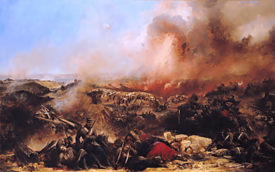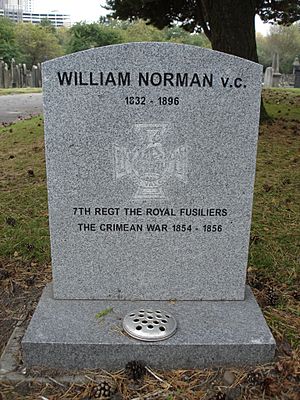William Norman (VC) facts for kids
Quick facts for kids
William Norman
|
|
|---|---|

Depiction of the Siege of Sebastopol
|
|
| Born | 1832 Warrington, Lancashire |
| Died | 13 March 1896 (aged 63–64) Salford, Lancashire |
| Buried |
Weaste Cemetery, Salford
|
| Allegiance | |
| Service/ |
|
| Years of service | 1853 - 1865 |
| Rank | Corporal |
| Unit | 7th Regiment of Foot |
| Battles/wars | |
| Awards | |
William Norman was a very brave English soldier. He lived from 1832 to 1896. He received the Victoria Cross, which is often called the VC. This is the highest award for bravery given to British and Commonwealth soldiers. It is given for amazing courage when facing the enemy.
A Brave Soldier's Story
William Norman was born in Warrington, a town in Lancashire, England. He joined the British Army on May 15, 1854. He became a private in the 7th Regiment of Foot. This regiment later became known as the Royal Fusiliers.
His Amazing Act of Bravery
William Norman's most famous act happened during the Crimean War. This war took place from 1853 to 1856. On December 19, 1854, he was fighting in Sebastopol, a city in Crimea.
Private Norman was on guard duty by himself. He was placed far in front of other soldiers. This spot was very dangerous and needed a lot of attention. Russian soldiers were about 300 yards away from him.
Three Russian soldiers came out to scout the area. They were hiding in the bushes. Private Norman, all by himself, managed to capture two of them. He did this without making any noise or alerting the other Russian soldiers. This was an incredibly brave and smart thing to do.
For his amazing courage, William Norman was given the Victoria Cross. Queen Victoria herself presented him with the medal. This special event happened in Hyde Park, London, on June 26, 1857.
Life After the War
After the Crimean War, William Norman continued to serve in the army. He fought in the Umbeyla Campaign in 1863. This campaign took place in a region called the North-West Frontier. He was promoted to the rank of corporal.
William Norman left the army in 1865. He had served his country bravely for many years.
His Later Years
William Norman passed away on March 13, 1896. He died in Salford, which is also in Lancashire. He was buried in a common grave at Weaste Cemetery in Salford. He was married and had three children.
Today, you can see William Norman's Victoria Cross and his other medals. They are on display at the Royal Fusiliers Museum. This museum is located in the famous Tower of London in England.


